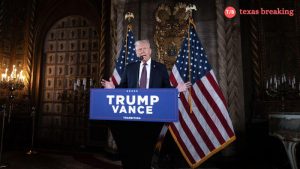Former President Donald Trump’s recent comments about Canada have garnered significant attention, raising eyebrows and concerns among Canadian leaders and citizens. Trump’s suggestion that Canada could become the 51st state of the United States, along with talks of using economic pressure to annex Canada, has triggered strong reactions from government officials in Canada. This bold rhetoric reflects an aggressive stance that may be seen as undermining the longstanding relationship between the two neighbors.
Donald Trump’s Imperialist Designs on Greenland, Canada, and Panama
Trump’s remarks aren’t just limited to Canada; he has also mentioned Greenland and the Panama Canal. He openly refuses to rule out military options and suggests using economic means to achieve his goals. By discussing these topics, Trump seems to echo a strategy dubbed “America First,” which emphasizes prioritizing U.S. interests over international cooperation. This approach may unsettle Canada and other nations.
Trump Keeps Military Force on the Table
The idea that military force could be considered to acquire Greenland or influence Canada is alarming to many. Trump’s son famously jokingly brought a “Make Greenland Great Again” bobblehead to the island, which didn’t sit well with Greenland residents. The possibility of military action, even if just mentioned in jest, points to a troubling level of seriousness regarding territorial ambitions.
Strong Responses from Canadian Leaders
The responses from Canadian officials have been firm. Finance Minister Dominic LeBlanc emphasized that Trump’s comments are no laughing matter. While initially taken lightly, the continuation of such rhetoric is viewed as a serious attempt to disrupt the Canada-U.S. relationship. Other lawmakers echoed these sentiments, labeling Trump’s comments as counterproductive and ridiculous.
Economic Ties Under Threat
Canada has significant economic ties with the United States, and Trump’s threats of tariffs add another layer of complexity. Canadian officials have warned that tariffs on American goods could occur if the trade relationship deteriorates. For instance, imports of Canadian crude oil are crucial to many states in the U.S., and any interruption could have serious repercussions for both countries.
How Trump’s Tough Talk Could Backfire
While Trump believes his aggressive stance may bolster U.S. interests, it risks alienating allies. Canadian leaders, including Prime Minister Justin Trudeau, have vowed not to back down from threats, insisting they will not be intimidated. Trudeau’s administration is prepared to retaliate if Trump’s tariff proposals go into effect, which could lead to economic consequences that would affect American consumers.
Continued Fallout from Trump’s Rhetoric
As Trump’s comments continue to circulate, the fallout is palpable. Will he revert to traditional diplomatic channels, or will this ongoing rhetoric become the new standard in U.S. politics? Canadian officials are keenly watching and preparing strategies to address Trump’s potential policies and ensure that their country’s interests are protected.
Future of U.S.-Canada Relations
This incident highlights the fragility of U.S.-Canada relations under aggressive political rhetoric. As both nations work through these challenging discussions, the fate of their partnership hangs in the balance. Will cooler heads prevail, or will Trump’s approach further escalate tensions? Only time will tell how these relationships will evolve in the coming months.





